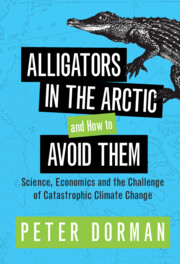 Alligators in the Arctic and How to Avoid Them
Alligators in the Arctic and How to Avoid Them Published online by Cambridge University Press: 14 July 2022
Two preliminaries: US experience points to the unprecedented challenge of the rapid, drastic energy transition we face, and the labor needed to accomplish it should regarded as a cost, not a benefit. This chapter thus encourages skepticism regarding claims that the cost of meeting carbon goals will be minimal and proposes questions that should be asked of optimistic studies. The most reliable analyses draw on integrated assessment models, which show we can achieve a two-thirds chance of limiting warming to 2° at moderate cost only by greatly overshooting corresponding carbon budgets, followed by decades of negative emissions using yet-to-be developed carbon removal technologies. Not predicating policy on these technologies, however, results in very high costs. Even so, these models don’t include the likelihood that much of the existing capital stock will be uneconomic to operate at high carbon prices, a potential source of enormous disruption. The closest analogy we have is the post-1989 shock in Eastern Europe when economic opening caused widespread shutdowns. It is important to be honest about costs: rosy forecasts are unconvincing, fail to prepare us for the problems we’ll need to solve and obscure the political economy of policy change.
To save this book to your Kindle, first ensure [email protected] is added to your Approved Personal Document E-mail List under your Personal Document Settings on the Manage Your Content and Devices page of your Amazon account. Then enter the ‘name’ part of your Kindle email address below. Find out more about saving to your Kindle.
Note you can select to save to either the @free.kindle.com or @kindle.com variations. ‘@free.kindle.com’ emails are free but can only be saved to your device when it is connected to wi-fi. ‘@kindle.com’ emails can be delivered even when you are not connected to wi-fi, but note that service fees apply.
Find out more about the Kindle Personal Document Service.
To save content items to your account, please confirm that you agree to abide by our usage policies. If this is the first time you use this feature, you will be asked to authorise Cambridge Core to connect with your account. Find out more about saving content to Dropbox.
To save content items to your account, please confirm that you agree to abide by our usage policies. If this is the first time you use this feature, you will be asked to authorise Cambridge Core to connect with your account. Find out more about saving content to Google Drive.